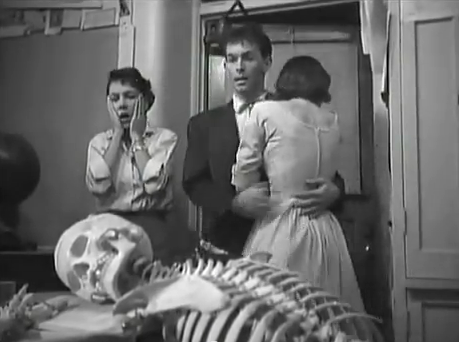Teenagers From Outer Space (reviewed by Lisa Marie Bowman)
The aliens have landed in California!
And they’re teenagers!
That may sound like the set up of a 1960s beach movie but actually, Teenagers From Outer Space is an oddly somber little movie from 1959. Now, just to be clear, somber does not necessarily equal good. There’s a lot of humor to be found in Teenagers From Outer Space but next to none of it’s intentional. Instead, this attempts to be a serious-minded movie that happens to be about intergalactic teens.
The teenagers are named Thor (Bryan Grant) and Derek (David Love). They’ve been sent down to Earth so that they can raise Gargons, which are these lobster creatures that are considered to be a gourmet delicacy on their own world. Thor is the arrogant and insensitive alien who thinks that he’s too good for Earth and reacts to nearly every social situation by pulling out his ray gun and firing. (Whenever Thor vaporizes anyone, a perfectly white skeleton — the type that you’d expect to see hanging in a classroom — is left behind.) Derek is sensitive and moody. He’s got the soul of a poet. He doesn’t want to vaporize people. Instead, he wants to explore Earth and maybe hang out in a cofee house while reading Kerouac. Though Derek may never actually say it, it’s obvious what’s going through his mind whenever he looks at the other teenagers from outer space. “The scene is totally squaresville, man,” Derek thinks, “Real melvin. Exploring planets with peaceful intentions is where it’s at!”
Anyway, Derek decides to run away and explore Earth on his own. He ends up renting a room in a boarding house owned by Grandpa (Harvey B. Dunn) and his daughter, Betty (Dawn Bender). Betty is immediately attracted to Derek, despite the fact that she already has a boyfriend (who is played by the film’s director, Tom Graeff). She’s not particularly surprised when Derek tells her that he’s from outer space. Nor is she upset when he reveals that, shortly after arriving on Earth, Thor vaporized her dog. (Judging from her nonplussed reactions to everything, I’m assuming that Betty was an avid reader of both Sartre and Camus.)
As for Grandpa, he spends most of his time hanging out on the front porch and talking to strangers. For instance, when Thor comes by and demands to know where Derek is, Grandpa cheerfully tells him. This, of course, leads to a lot of innocent people being vaporized but Grandpa never seems to feel particularly bad about it. Certainly, no one in the movie ever takes the time to point out how much trouble could have been avoided if Grandpa wasn’t so talkative.
Derek really just wants to stay on Earth but Thor knows that Derek is secretly the son of their planet’s leader and therefore, cannot be allowed to run away. Why doesn’t Derek know this? I have no idea. It’s possible the movie explained this turn of events while I was busy wondering why no one seemed to be upset about all the skeletons that were turning up around town.
Anyway, as I said, there aren’t many intentional laughs to be found in Teenagers From Outer Space but there’s plenty of unintentional ones. Between Betty’s calm acceptance of everything that Derek tells her and David Love’s continually confused stare and blank line readings, it’s impossible not to smile while watching this movie.
Teenagers From Outer Space was written, directed, and produced by Tom Graeff. Shortly after this film came out, Graeff took out an ad in the Los Angeles Times and proclaimed himself to be the second coming of Christ. Hey, why not? After you make a movie like Teenagers From Outer Space, I suppose it seems like anything could be possible. Unfortunately, Graef committed suicide in 1970 and he didn’t get to see his misbegotten little film find a second life as a cult favorite.
Teenagers From Outer Space. It’s not very good but it certainly is watchable.

